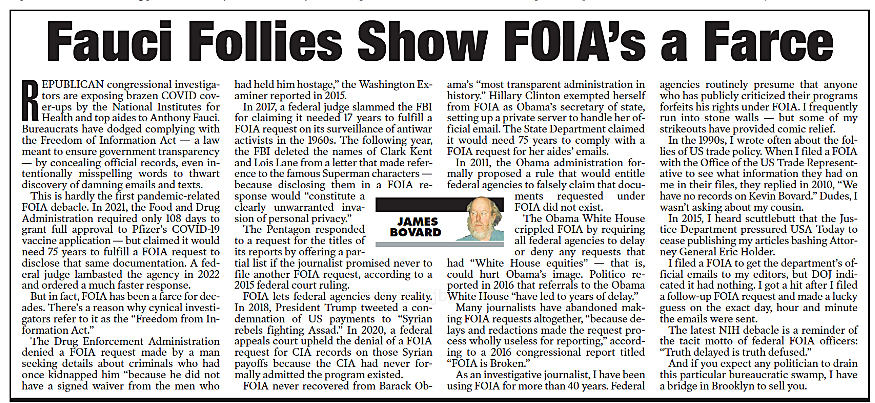Fauci’s FOIA follies show ‘transparency’ in Washington has always been a fraud
by James Bovard
Republican congressional investigators are exposing brazen COVID cover-ups by the National Institutes for Health and top aides to Anthony Fauci. Bureaucrats have dodged complying with the Freedom of Information Act — a law meant to ensure government transparency — by concealing official records, even intentionally misspelling words to thwart discovery of damning emails and texts.
This is hardly the first pandemic-related FOIA debacle.
In 2021, the Food and Drug Administration required only 108 days to grant full approval to Pfizer’s COVID-19 vaccine application — but claimed it would need 75 years to fulfill a FOIA request to disclose that same documentation. A federal judge lambasted the agency in 2022 and ordered a much faster response.
But in fact, FOIA has been a farce for decades. There’s a reason why cynical investigators refer to it as the “Freedom from Information Act.”
The Drug Enforcement Administration denied a FOIA request made by a man seeking details about criminals who had once kidnapped him “because he did not have a signed waiver from the men who had held him hostage,” the Washington Examiner reported in 2015.
In 2017, a federal judge slammed the FBI for claiming it needed 17 years to fulfill a FOIA request on its surveillance of antiwar activists in the 1960s.
The following year, the FBI deleted the names of Clark Kent and Lois Lane from a letter that made reference to the famous Superman characters — because disclosing them in a FOIA response would “constitute a clearly unwarranted invasion of personal privacy.”
The Pentagon responded to a request for the titles of its reports by offering a partial list if the journalist promised never to file another FOIA request, according to a 2015 federal court ruling.
FOIA lets federal agencies deny reality. In 2018, President Trump tweeted a condemnation of US payments to “Syrian rebels fighting Assad.” In 2020, a federal appeals court upheld the denial of a FOIA request for CIA records on those Syrian payoffs because the CIA had never formally admitted the program existed.
FOIA never recovered from Barack Obama’s “most transparent administration in history.”
Hillary Clinton exempted herself from FOIA as Obama’s secretary of state, setting up a private server to handle her official email. The State Department claimed it would need 75 years to comply with a FOIA request for her aides’ emails.
In 2011, the Obama administration formally proposed a rule that would entitle federal agencies to falsely claim that documents requested under FOIA did not exist. The Obama White House crippled FOIA by requiring all federal agencies to delay or deny any requests that had “White House equities” — that is, could hurt Obama’s image. Politico reported in 2016 that referrals to the Obama White House “have led to years of delay.”
Many journalists have abandoned making FOIA requests altogether, “because delays and redactions made the request process wholly useless for reporting,” according to a 2016 congressional report titled “FOIA is Broken.”
As an investigative journalist, I have been using FOIA for more than 40 years. Federal agencies routinely presume that anyone who has publicly criticized their programs forfeits his rights under FOIA. I frequently run into stone walls — but some of my strikeouts have provided comic relief.
In the 1990s, I wrote often about the follies of US trade policy. When I filed a FOIA with the Office of the US Trade Representative to see what information they had on me in their files, they replied in 2010, “We have no records on Kevin Bovard.” Dudes, I wasn’t asking about my cousin.
In 2015, I heard scuttlebutt that the Justice Department pressured USA Today to cease publishing my articles bashing Attorney General Eric Holder. I filed a FOIA to get the department’s official emails to my editors, but DOJ indicated it had nothing. I got a hit after I filed a follow-up FOIA request and made a lucky guess on the exact day, hour and minute the emails were sent.
The latest NIH debacle is a reminder of the tacit motto of federal FOIA officers: “Truth delayed is truth defused.” And if you expect any politician to drain this particular bureaucratic swamp, I have a bridge in Brooklyn to sell you.
James Bovard’s latest book is “Last Rights: The Death of American Liberty.”


Comments are closed.